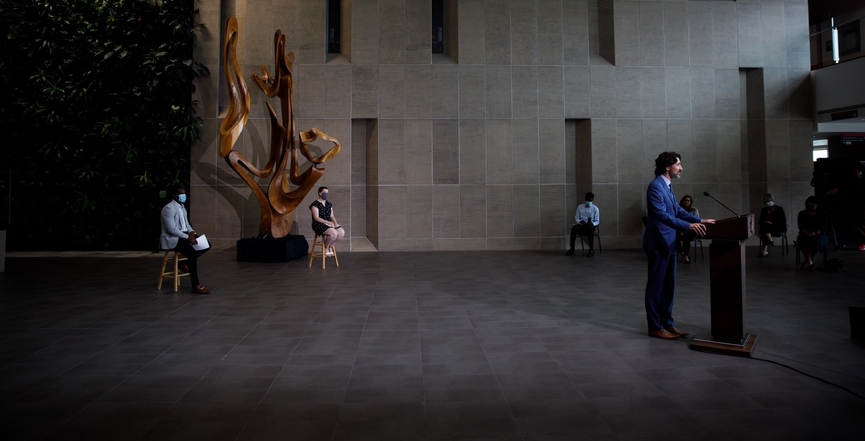Justin Trudeau and his Liberal government have an insurance policy. As the Conservative Party of Canada leadership race demonstrates, the official Opposition is many miles away from establishing itself as a government-in-waiting.
The leadership contestants have been appealing to the CPC right-wing base, recruited from former Reform party members. The CPC candidates failed to express themselves fluently in a French language debate.
Meanwhile, the Liberal government has focused on managing the current sanitary crisis, while postponing decisions on the fundamental questions that require sustained attention.
Believing themselves safe so long as the Conservatives have little popular support in the country, the Liberals are ignoring major issues that threaten economic and social well-being.
Energy export revenues are weakening as the price of oil tumbles. The Ontario portion of the U.S. auto sector is shrinking.
With the export income that pays for increasing imports sinking, the foreign exchange market will want to price the Canadian dollar lower. A falling dollar takes with it the standard of living.
Market driven solutions such as increasing international indebtedness, as well as letting the dollar float downwards will not make up for structural economic weaknesses.
The Liberals have failed to demonstrate an ability to go beyond image management, and implement policies that help Canadians secure a better future.
Intent on forging a poor new NAFTA, Canada under Trudeau has tied its foreign policy directly to U.S. policy: on Russia, by introducing and maintaining sanctions; on China, by contributing an arrest to the U.S. trade war against Huawei; on Iran, by breaking off diplomatic relations; on Latin America, by supporting the overthrow of the Venezuelan government; on Palestine, by refusing to condemn human rights violations by Israel; and by committing to new military options such as drones, instead of renewing peacekeeping operations with the UN.
The world community was not impressed, rejecting Canada’s bid to occupy a rotating seat on the UN Security Council.
Major U.S. digital monopolies are replacing the brick and mortar retail trade, killing off print media, radio and television advertising (Facebook and Twitter); and Canada has not even figured out how to tax them.
The parliamentary budget office just justified its existence by revealing that wealth inequality in Canada has increased exponentially — the top one per cent have 25.6 per cent of all wealth, not 13.7 per cent as previously believed. How much longer can taxing wealth, inheritance, corporate capital, financial transactions and luxury good be ignored?
The COVID-19 crisis has allowed the Liberal government to compensate for five years of a mediocre performance in office by acting to put money into peoples hands during the economic shutdown. But if anything, the pandemic intensifies the need to reset the government agenda.
Ecological and social determinants of health need to factored into to designing a healthy-communities approach to policies for income security, housing, transit, long term care and retirement, child care, pharmacare, and dental care.
The need to integrate climate, Indigenous reconciliation, and a green economic strategy is obvious to the Liberal government, but ministers seem unaware they are supposed to do something about it.
The Justin Trudeau method of government is to let events run their course. Taking action on a controversial issue divides the citizenry, causing problems for those taking difficult decisions. The prime minister prefers to do nothing rather than anger voters.
Federal leadership and planning is required for Canada to thrive in the emerging world knowledge-based economy. Instead, the Liberals defer to the right-wing provincial governments still pushing austerity and neoliberal market solutions.
Since Trudeau became Liberal leader in 2013, the Conservative political strategy has been to attack him personally. The attempt to undermine Trudeau as a leader has failed.
While the personality of the prime minister produces a “Trudeau derangement syndrome” in some media and academic critics, as well as in political adversaries, for the most part Canadians have not bought into the Conservative narratives about Justin Trudeau being unfit to govern.
As problems without solutions pile up, expect the pressure for change to increase dramatically. If, under a new leader, the Conservatives decide to join the 21st century, Liberal failings will be there to exploit. The NDP and the Greens will grow as progressives realize how much is being left undone.
How long will it be before Canadians turn away from Justin Trudeau?
Duncan Cameron is president emeritus of rabble.ca and writes a weekly column on politics and current affairs.
Image: Justin Trudeau/Twitter



